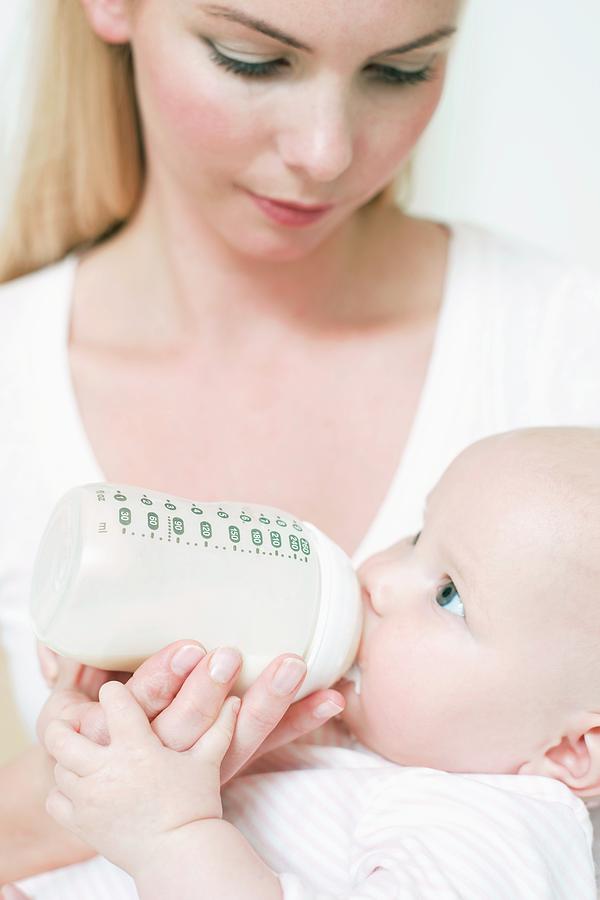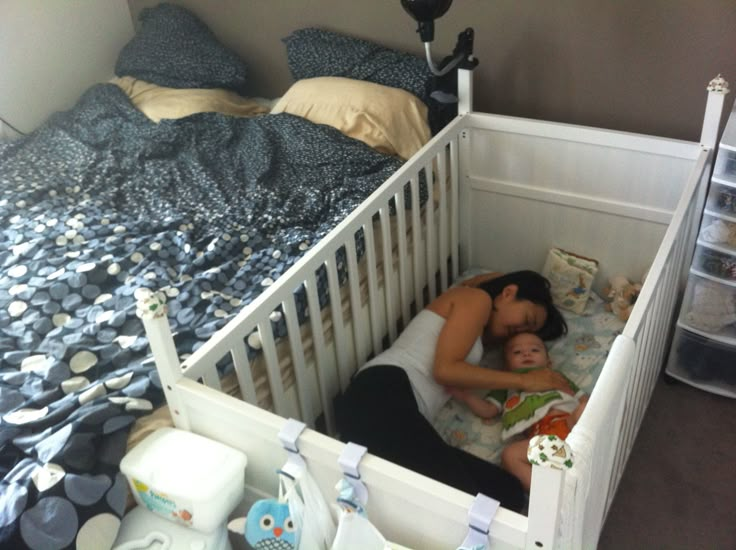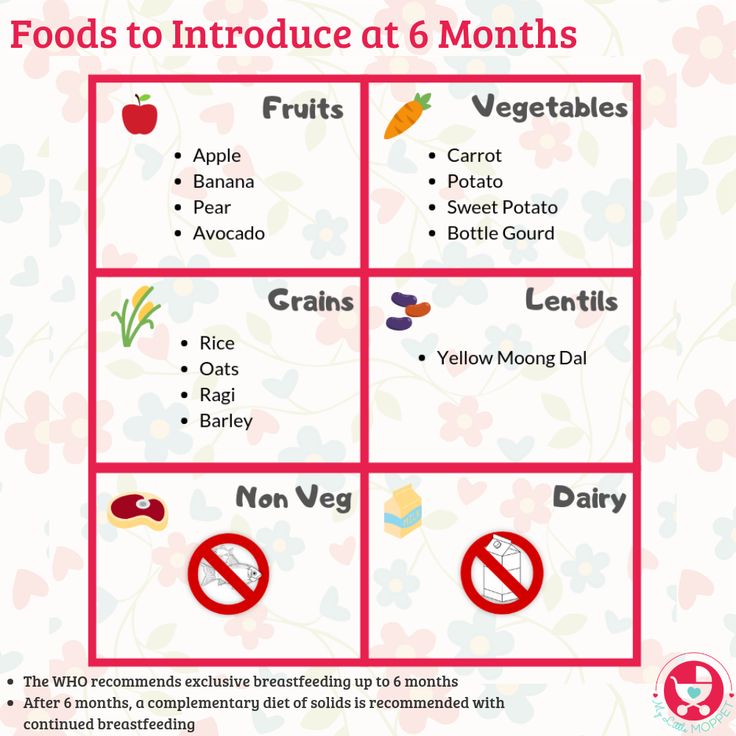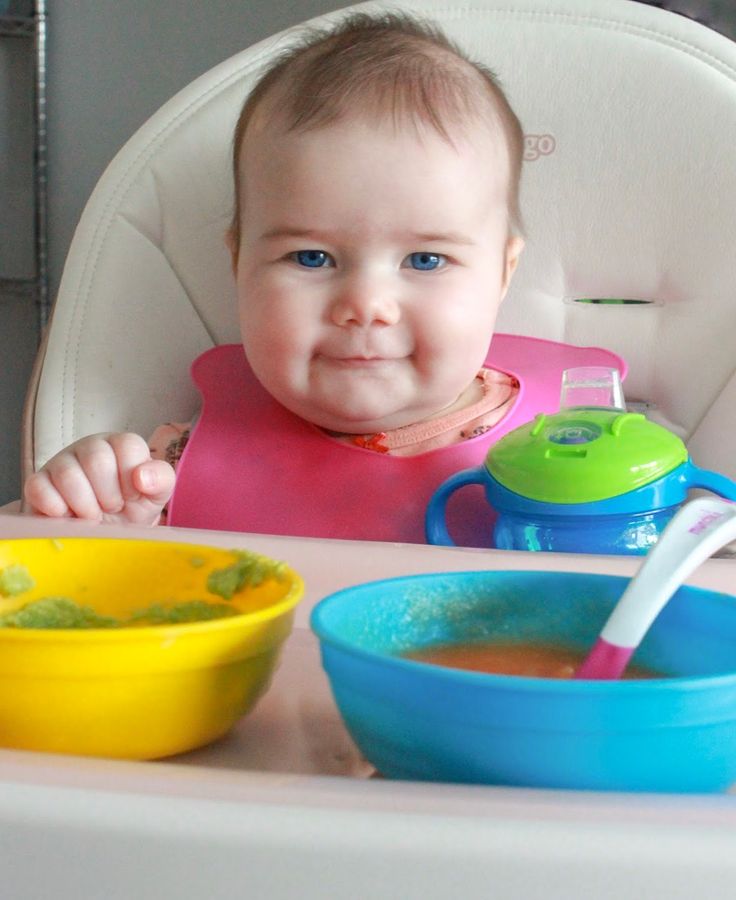Stop baby feeding to sleep
How to Stop Nursing Baby to Sleep
Disclaimer - Nothing on this website is intended to be a substitute for professional medical advice, diagnosis, or treatment... Read More Here.
There’s nothing more magical than watching your angelic newborn slowly drift off to sleep at the breast. These are the sweet memories you’ll hold on to years later when you’re dropping your not so tiny child off at college.
Breastfeeding is an incredibly comforting experience that incorporates bonding via skin-to-skin contact and sleep-inducing hormones that lull your little one into a dreamy state. After the newborn days are over, it’s important to teach your baby to fall asleep in different ways.
Navigation
Cons of Nursing Baby to Sleep
When to Stop Nursing Baby to Sleep
How to Stop Nursing Baby to Sleep
Frequently Asked Questions
Conclusion
Keep reading for our top tips on how to stop nursing baby to sleep.
Cons of Nursing Baby to Sleep
When to Stop Nursing Baby to Sleep
Frequently Asked Questions
Conclusion
Cons of Nursing Baby to Sleep
If your little cherub relies on feeding at bedtime, it could lead to dependency and other problems down the road.
It Could Lead to a Suck-to-Sleep Association
When you turn in at night, you likely have some semblance of a bedtime routine that includes activities like brushing your teeth, donning jammies, or reading. Your babe is no different! A consistent bedtime routine tells her little body that it’s time to rest.
There’s nothing wrong with drawing on the powerful, sleep-inducing effects of nursing to get your little one ready for bed. The problem is when your little one starts to depend on sucking to fall asleep and won’t fall asleep any other way. This dependency could make it extra challenging down the road when it comes time to wean or when your baby consistently wakes and needs to nurse to fall back asleep.
It Could Make it Harder for Others to Feed the Baby
If you’re still in the early newborn phase, it may seem hard to believe that you’d ever need a break from your tiny bundle of joy. But trust us when we say, there will come a day when a date night or little getaway is essential for your health and sanity. And if being latched onto Mommy is the only way your little man will doze off, you’ve got a problem!
This can also pose a challenge when it comes to getting your partner involved, so it’s important to introduce a bottle early on if you plan to share this magical bonding experience.
Need help? Check out our sanity-saving tips for sleeping while breastfeeding.
It Could Increase Your Emotional Toll
When nobody but Mama will do, parenting can become exhausting really fast (especially at 3 AM when your baby wakes for the 5th time that night). The increased physical and emotional demands can really take a toll on Moms who are already dealing with a slurry of hormones and sleep deprivation.
Postpartum depression is becoming increasingly common among new Moms, so it’s important to reduce stress in any way you can. Sharing the responsibility of feeding can go a long way in setting both Mom and baby up for success.
When to Stop Nursing Baby to Sleep
In the early days, letting your babe fall asleep at the breast is fine. As time passes, it’s important to pay attention to signs that it’s becoming a problem.
If Your Baby Uses Your Breast as a Pacifier
Do you ever feel like a human pacifier? That’s because, sometimes, you are! Plenty of research has pointed to the comforting benefits of breastfeeding for pain relief in infants.
Comfort nursing is fine from time to time, especially during illness or teething. However, if your babe frequently comfort sucks—a fluttering suck without swallowing—it’s time to unlatch.
Some babies truly have a higher need to suck, which is important for oral development. If that’s the case, you can try offering a real pacifier.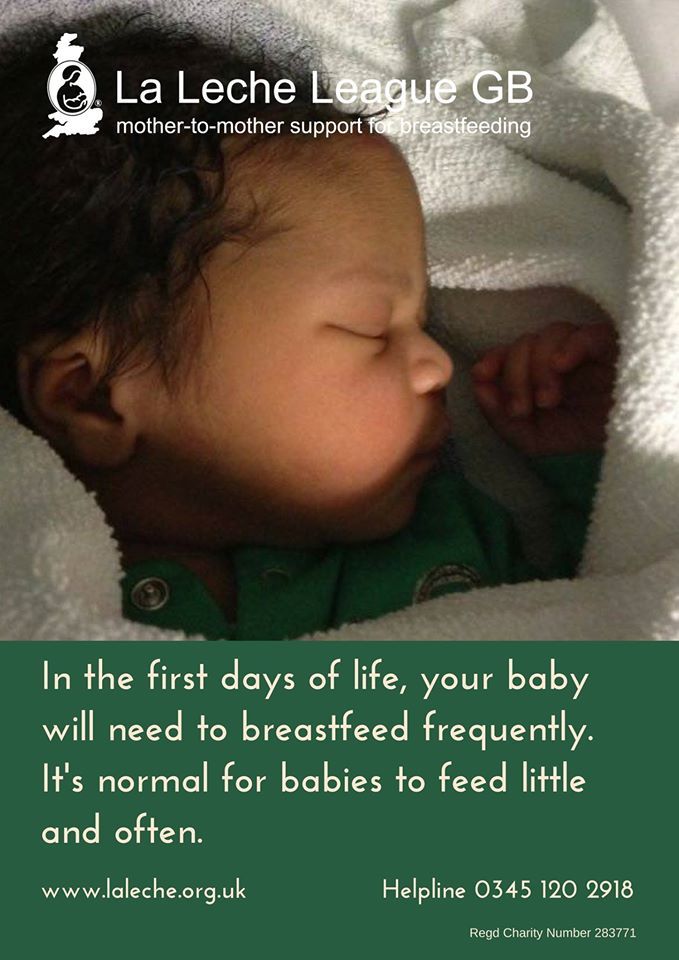
If Your Baby Won't Sleep or Nap Without Nursing
We all have weird habits at bedtime. Maybe you like to sleep with a window open or the television on. Babies can develop habits when it comes to sleep too, but habits are only beneficial if they encourage sleep, not hinder it.
Sure, nursing will help your sweet cherub fall asleep quickly, but what happens when he wakes and his human pacifier is gone? He’ll want to nurse again to help him fall back asleep. And again. And again. You get the picture.
If Your Baby Wants to Nurse All Night
Marathon nursing sessions are common in the early days when newborns are just figuring things out. Add on frequent growth spurts and day/night confusion, and you’ll quickly understand why parents of newborns look like characters out of some zombie flick.
Babies have lighter and shorter sleep cycles than adults, so they have multiple opportunities for waking overnight. If your babe has developed a dependency on sucking to sleep, she’ll likely be demanding to nurse every 45 minutes…all…night…long.
How to Stop Nursing Baby to Sleep
If your tiny tot relies on nursing to sleep, don’t panic. Let’s talk about how to gradually help your babe learn to fall asleep in different ways.
Start with Naps
Many parents find it easier to start with naptime since they’re less exhausted and more likely to stick to a new plan than in the middle of the night. Once you’ve mastered naptime, it should be easier to start implementing a new routine at bedtime too.
One of the first steps is to establish a daily routine. This doesn’t have to be so rigid that you feed your babe every day at noon and promptly put her down for a nap at 1 PM. It’s important to pay attention to your little one’s cues and respond promptly when he’s tired or hungry. But, it can also help to have a flow to your day.
Many people love the “Sleep, Eat, Play” approach. This helps to remove the association between feeding and sleeping. In its place, you can create a naptime routine involving songs, stories, and dimming lights that cues your babe that it’s time to snooze.
Find Other Ways to Soothe the Baby
As a new Mom, it can be hard to listen to our precious newborn’s cry. Our first instinct is to put our babe to breast to since we know that will calm them down, regardless of the source of the cry. Believe it or not, sucking isn’t the only thing that can calm a crying baby.
First made famous by baby sleep expert, Harvey Karp, the 5’S approach to calming babies has even been published in a research article by the American Academy of Pediatrics. The S’s include sucking, swaddling, side or stomach (but not when sleeping), shushing, and swinging.
These approaches have been proven to help calm babies after vaccines, so they’re definitely worth a try at home too! Combine them with a calming bedtime routine and an environment conducive to rest. Consider installing blackout curtains, using a humidifier, turning on white noise, and keeping the optimal room temperature for babies.
Let Your Partner Put Baby to Bed Sometimes
Mothers carry babes for nine months so its only natural to feel a strong attachment and have a hard time letting others share responsibilities like feeding and bedtime. Getting your little one used to being put down by someone else now will be extremely useful down the road. This can be a powerful bonding time for partners too!
Getting your little one used to being put down by someone else now will be extremely useful down the road. This can be a powerful bonding time for partners too!
If nursing is part of your bedtime routine, go ahead, and nurse until baby is drowsy but not yet asleep. Let your partner or another family member finish with a story, lullaby, and putting your little angel down in her crib. She may fuss and protest at first, but eventually, she will get the hang of it and may even sleep a little longer (one can hope).
Trying to be Super Mom will only burn you out and increase your risk for Postpartum Depression. Give yourself (and your partner) the permission to share bedtime for your tiny tot.
Don't Stimulate Baby at Bedtime or Naptime
Have you ever stayed up too late watching something thrilling then found yourself unable to fall asleep? The same thing can happen to your babe, except stimulating in his little world can be as simple as going out to a crowded restaurant or visiting with company.
Sometimes, these things can’t be avoided, but whenever possible, try to avoid outings or visitors in the hour before bedtime. This may mean having to change your lifestyle for the time being, ordering in, and scheduling visits earlier in the day.
Another source of stimulation is playtime! Yep, simply playing peek-a-boo with Daddy can excite your kiddo enough that she has trouble conking out when it comes time to sleep. Try keeping playtime away from naps and bedtime and having a wind-down time with dim lights, calming music or sound machine, a warm bath, and a soothing infant massage.
Stop Nursing Before Baby Falls Asleep Completely
Babies wake repeatedly in the night and will struggle to fall back asleep if the conditions have changed. This means that if your baby falls asleep nursing, she’ll want to nurse again to fall back asleep. By teaching her to fall asleep on her own, she’ll learn the valuable lesson of self-soothing so that she’ll only need you when she’s truly hungry or in pain.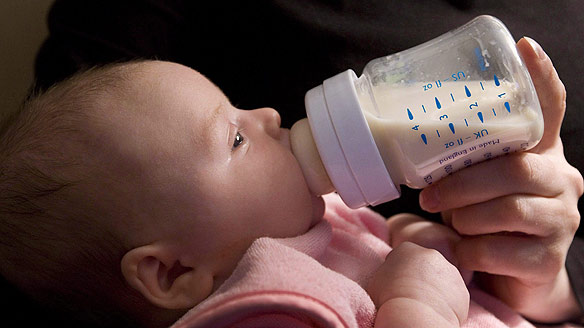
If your babe is attached to your nipple (literally), you’ll need to start by unlatching before he falls asleep. Try gently inserting a finger, and breaking the latch once his sucks become more like tiny flutters and he’s no longer swallowing. If he starts crying or trying to re-latch, try some of the other soothing techniques we talked about earlier.
This will take some time to get your baby used to not fully nursing to sleep, but eventually, your baby will understand that eating and sleeping are separate.
Wean the Baby Gradually
Weaning your baby off of breastfeeding fully to sleep won’t happen overnight. You’ll likely have to repeat the un-latch, soothe, re-latch, un-latch, soothe cycle over and over the first few nights or maybe even weeks. The suck-to-sleep association is one of the strongest to break, but the results will be well worth it!
Not only will this help her learn to self-soothe, but you’ll also be cutting down on nighttime wakings that aren’t related to hunger (yay sleep!).
Frequently Asked Questions
Will the baby stop nursing to sleep on their own?
Yes, from a developmental perspective, most babies do eventually learn to stop nursing to sleep. However, this could take months or even years. Historically, children didn’t wean until they were three or four years old.
While some families continue to practice extended breastfeeding, most find that children continue to nurse before bed, but usually unlatch before falling asleep entirely. Many of these families also practice co-bedding which can help to minimize sleep disruptions when practiced safely.
If you’re not worried about your baby falling asleep while nursing, then you can continue to do so. If and when there comes a time that you feel you’re ready to help your baby gently wean from falling asleep sucking, you can use the gradual approach we talked about earlier. Always remember that your parenting journey is yours and doesn’t have to look like anyone else’s.
Can I still feed my baby before bed?
Absolutely! In fact, there may even be some benefits thanks to something known as Chrononutrition. Recent research has discovered that the contents of breastmilk change throughout the day. Morning milk has higher levels of the stimulating hormone, cortisol, while evening milk has higher levels of sleep-inducing melatonin and tryptophan.
Recent research has discovered that the contents of breastmilk change throughout the day. Morning milk has higher levels of the stimulating hormone, cortisol, while evening milk has higher levels of sleep-inducing melatonin and tryptophan.
Tryptophan is an amino acid that is a precursor to the neurotransmitter, serotonin, which makes you feel happy and regulates mood. Ingesting tryptophan early in life is important for proper brain development. These components in breastmilk can also help to regulate a newborn’s circadian rhythm since they often have their days and nights reversed.
Feeding your baby before bed can be an incredible time of bonding and help prepare your little one for sleep. If you’re trying to break a suck-to-sleep association, you can continue to feed until your little one is sleepy but awake. After feeding, unlatch, and help your little one fall asleep in a different way.
Conclusion
Breastfeeding is an incredibly powerful and amazing act. You are literally keeping your little one alive by what you’re making with your body. Breastmilk contains amino acids and hormones that make your baby feel sleepy, not to mention the comforting act of sucking—so it’s no wonder that babies love to nurse to sleep.
Breastmilk contains amino acids and hormones that make your baby feel sleepy, not to mention the comforting act of sucking—so it’s no wonder that babies love to nurse to sleep.
However, if your baby will only fall asleep nursing, you may want to consider helping her fall asleep in different ways using the gentle techniques we’ve suggested. Having a baby who can fall asleep without your help means that they can fall back asleep without your help, and that means you’ll be getting some much needed Zzz’s.
More Reading:
Sleep Advisor
Website
Our team covers as many areas of expertise as we do time zones, but none of us started here as a so-called expert on sleep. What we do share is a willingness to ask questions (lots of them), seek experts, and dig deep into conventional wisdom to see if maybe there might be a better path towards healthy living. We apply what we learn not only to our company culture, but also how we deliver information to our over 12. 7M readers.
7M readers.
Sleep research is changing all the time, and we are 100% dedicated to keeping up with breakthroughs and innovations. You live better if you sleep better. Whatever has brought you here, we wish you luck on your journey towards better rest.
How to Stop Nursing to Sleep
Learn how to stop nursing to sleep, no matter what age your baby or toddler is. I’m breaking it down by each age group so you can have a plan in place to stop nursing to sleep.
Breaking the feeding-to-sleep association can be one of the harder sleep props for moms to break. It’s one of the reasons so many baby and toddler sleep experts teach parents how to start an eat play sleep routine so they learn how to separate feeding and sleeping from the start.
But many parents get in the habit of feeding to sleep either out of ease, desperation, or another reason.
The problem with nursing to sleep is that babies wake up multiple times in the middle of the night. In fact, we all do!
But when we wake up and feel our familiar bed and see our familiar environment, we can easily fall back asleep, without even realizing we woke up.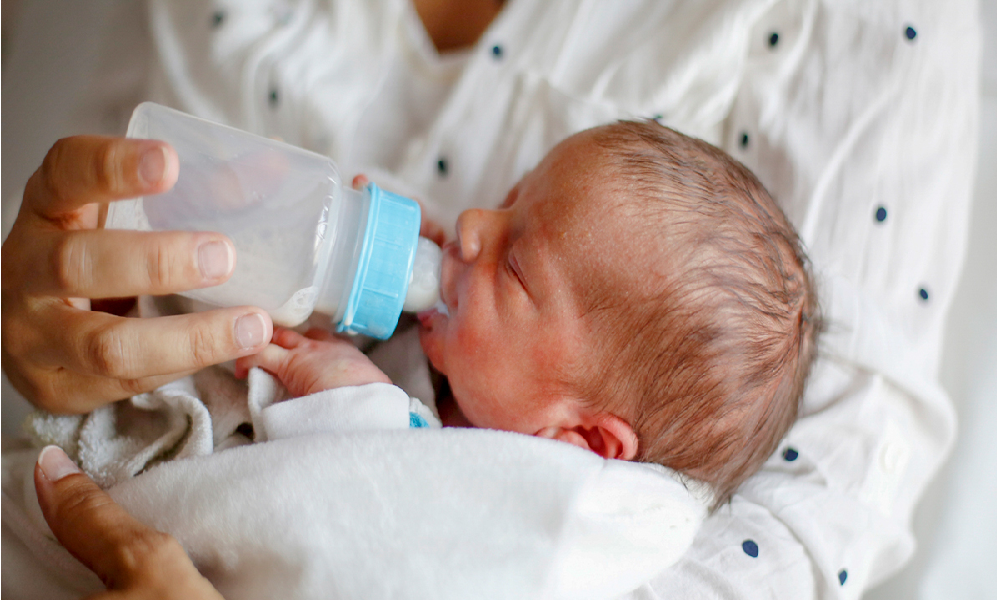
When babies are nursed to sleep, they fall asleep on the breast and typically in mom’s arms. When they wake up hours (or minutes) later, they find themselves in a completely different environment—without a breast or their mom!
They come to need the same thing (breastfeeding in this case) that helped them get to sleep initially to go back to sleep each and every time they wake up in the middle of the night. This can leave parents exhausted and moms feeling like an all-night milk machine.
If you’re wondering how to stop nursing to sleep, I’m breaking it down by each age group so you can troubleshoot based on your baby’s age.
Your strategy for how to get your baby to sleep without nursing will vary depending if you’re working with a newborn, baby, or toddler.
Read on to find your baby’s age group and learn how you can stop nursing to sleep and establish independent sleeping habits.
Babies Under 4 Months Old
If you want to establish good sleep habits from the beginning and want to know how to break the breastfeeding sleep association early on, it’s completely possible!
Newborns are very sleepy in those first few months and it is common and normal for them to fall asleep at the breast or bottle. Try to keep your newborn awake during feeds so they can get a full feed and not fall asleep while eating.
Try to keep your newborn awake during feeds so they can get a full feed and not fall asleep while eating.
This will be challenging when they are first born, but should get easier as your baby turns 2 to 3 months old.
Practice separating feeding from sleeping by following an eat play sleep routine.
In those early months, your baby will fall asleep while feeding—that’s okay!
Don’t stress over it too much and just continue to separate feeding from sleep when you can. Even a quick diaper change after the feed can help.
Another important component of getting your baby to fall asleep independently is following their proper wake windows to make sure your baby doesn’t become overtired.
Up until about 3 months old, babies can only stay awake for about 60 minutes before they start to get overtired. An overtired baby will have a harder time falling asleep and staying asleep—so pay attention to that clock.
If your baby is having a hard time falling asleep, you can use soothing methods such as white noise, firm touch, and a pacifier to help get them to sleep without defaulting to feeding.
If you need more help establishing good sleep habits with your 0 to 4 month old, check out my Newborn Sleep Program.
Babies Over 4 Months Old
Wondering how to get your older baby to sleep without nursing? It’s very possible! If you haven’t established an eat play sleep routine, it’s not too late to start teaching your baby independent sleep habits.
If your baby is addicted to nursing to sleep and over 4 months old, you can use a sleep training method to teach your baby independent sleep. My favorite method for this age is the Gentle-Three-Minute Drill.
I always recommend starting sleep training at night time first and slowly working your way toward naps. The drive for sleep is greater at night, so you’re more likely to see success and stick with it versus if you focused on naps first.
You’ll want to make sure other elements are in place before sleep training, including an optimized sleep environment and that your baby is on an age-appropriate sleep schedule.
Use white noise and nursery blackout curtains to optimize your baby’s sleep and set them up for success. I have a few other baby nursery must haves that help create a conducive sleep environment.
If you’ve been co-sleeping and want to transition your baby to their crib, now is also a great time to do that.
Make sure you are equipped with a plan before you start to sleep train. Being consistent will make all the difference in getting your baby to sleep.
If you want a guide on how to stop nursing to sleep for your 4 month old through 2.5 year old, I have you covered!
The Baby D.R.E.A.M. System walks you through the process of sleep training and how to stop baby from comfort nursing all night long as well as how to stop nursing to sleep for naps so your whole family can get better sleep. Check it out here.
How Do I Get My Toddler to Sleep without Nursing?
At some point, nursing to sleep becomes even more of a hindrance to sleep and nursing to sleep stops working as effectively.
If your baby is waking up multiple times in the middle of the night to comfort nurse, it’s become a habit. We know most babies don’t need a night feed due to hunger at this age.
If you’ve been nursing to sleep long into the toddler years, it may be more challenging to establish new patterns, but it’s still possible! In fact, I believe it’s never too late to start setting up good sleep habits with your baby or toddler.
Many moms think they’ll have to wean their baby from breastfeeding completely if they want to stop nursing to sleep. But that isn’t the case. If you want to continue to breastfeed but stop feeding your toddler to sleep, you can!
For toddlers under 2.5 years old, the Baby D.R.E.A.M. System will be your guide to stop nursing your toddler to sleep. In it, I walk you through the most effective sleep training techniques to use for this age and stage.
If your toddler is out of a crib and over 2.5 years old, you’ll need a different approach. The good news is your toddler can understand way more than you realize at this age.
You can follow the strategy I lay out in my Toddler Sleep Training Guide. Just remember, consistency is key when working with this age group.
Make sure you spend plenty of time in your toddler’s room playing games and creating positive associations. It will help them feel safer and more at peace in their room at night.
How Do I Stop Comfort Nursing At Night?
In my experience working with parents, once they start using a sleep training technique to help their baby get to sleep for bedtime it’s easier to wean night feedings as well.
Once your baby learns how to fall asleep independently for bed, they start to learn how to put themselves back to sleep when they do wake up in the middle of the night.
With time and consistency your baby will learn how to fall asleep on their own and won’t wake up to comfort nurse anymore.
After you tackle bedtime and stop comfort nursing at night, you’re ready to tackle naps! You can stop nursing to sleep for naps the same way you did for bedtime.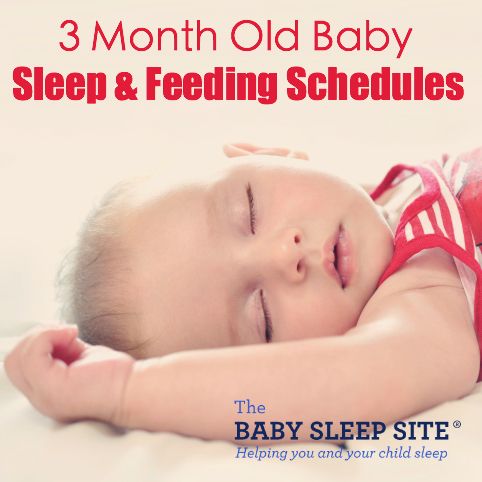
Want me to come alongside you and equip you with a plan and the confidence of how to stop nursing to sleep and get your baby or toddler sleeping longer stretches at night?
Book a free 15-minute call with me to learn how I can work with your family to get everyone the sleep they deserve!
I have helped many families stop the habit of nursing to sleep and setting up better sleep for their whole family. I’d love to do the same for you!
- Author
- Recent Posts
Amy Motroni
I'm Amy and I'm so glad you've stopped by! As a Certified Pediatric Sleep Consultant, my goal is to walk you through the process of getting your baby to sleep, so your whole family gets the rest they need!
My blog is full of things to help you celebrate motherhood including baby nursery ideas, sleep schedules and sleep tips, fun printables, baby registry must-haves, and so much more.
Latest posts by Amy Motroni (see all)
90,000 how to put a baby to sleep without breastfeeding04/21/2011
1152216
1294
Feeding and sleep
3-9 months --1.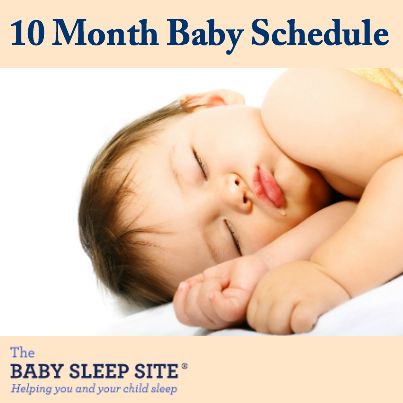 5–3 years
5–3 years
Article
Elena Muradova
Elena Muradova
Head of the BabySleep Center, the first sleep consultant in Russia, author of the BabySleep methodology
Mother of three children
One of the most common questions that a sleep consultant is asked is how to teach a child to fall asleep without breastfeeding. Is it possible to separate sleep and food, and should a child be taught to fall asleep without breastfeeding?
Baby crisis calendar
Why does the mother want to stop breastfeeding?
Between the ages of 9 and 15 months, many children experience a dramatic deterioration in sleep. The baby may wake up 8-10 times a night or even more often, it is difficult to put him back to bed, he constantly requires feeding (especially if he is used to breastfeeding on demand).
Mother and child do not get enough sleep. Constant sleep disturbance, irritation and fatigue are unbearable.
The mother is told that “the baby cannot sleep well if you are breastfeeding”, “only the completion of breastfeeding helped with the baby's sleep”. It seems that neither she nor the baby can sleep properly because of breastfeeding. Mom decides to wean the child from breastfeeding.
It seems that neither she nor the baby can sleep properly because of breastfeeding. Mom decides to wean the child from breastfeeding.
Stop, mom!
Baby's sleep problems are not related to breastfeeding. It's all about dream associations. This is how the child is used to falling asleep. If you want to keep breastfeeding and still sleep well, you need to separate food and sleep. That is, to divide the time of sleep and feeding. You will be able to feed the baby before bedtime, and then he will fall asleep. On nighttime awakenings, you will quickly put him to sleep again. You will cut down on nightly attachments, but keep breastfeeding comfortable.
This is a very important topic. It is very difficult to defeat a stereotype that has existed for a long time. Year after year, moms improve their babies' nighttime sleep through weaning. Sleep and food are separated, the association for sleep - breast sucking - is removed, and the child begins to sleep wonderfully at night.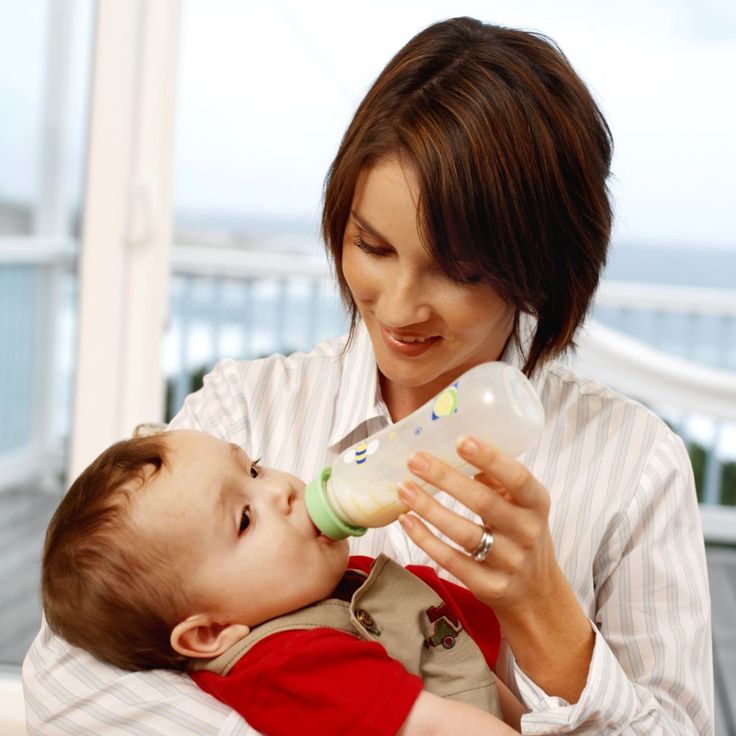
The delighted mother tells all her friends about this method of improving sleep and willingly shares the secret of good sleep on the Internet. Sometimes she regrets that she had to turn off breastfeeding so early, she wanted to feed longer, and the child gets sick more often. But sleep is more important. It was simply impossible to endure sleep problems anymore, the child had to be weaned, there was no choice. But there is a choice!
How does a baby who sleeps on his chest sleep?
Let's see how a baby sleeps who falls asleep exclusively at the breast. Evening, the child is tired, it's time for sleep. From birth, the child is used to the fact that the mother gives him the breast to fall asleep. It is so natural and pleasant, warm and comfortable. This is the association for sleep. To fall asleep, the child needs to eat, that is, sleep = food. Many somnologists in Russia, America and Europe consider falling asleep on the chest a “wrong” association for sleep. Why wrong? Because it impairs sleep. Waking up at night, the child cries and demands to create the conditions in which he is used to falling asleep. That is, he does not need food, but help to continue sleeping.
Why wrong? Because it impairs sleep. Waking up at night, the child cries and demands to create the conditions in which he is used to falling asleep. That is, he does not need food, but help to continue sleeping.
Indeed, children often wake up at night, and this is an absolute norm. The child sleeps with awakenings between sleep cycles. We adults do too. But we immediately fall asleep again and do not remember this. And in order to continue sleep after the next awakening, the child needs the usual conditions for falling asleep (after all, he simply does not know how to fall asleep in a different way), in our case, the chest.
Should everyone separate food and sleep?
I don't think going to bed breastfeeding is a bad association for anyone. In the world, most sleep experts are men. Probably, they cannot fully believe that many mothers do not even know exactly how many times their baby is fed during the night when sleeping together with a child, because. Night feedings do not interfere with their sleep.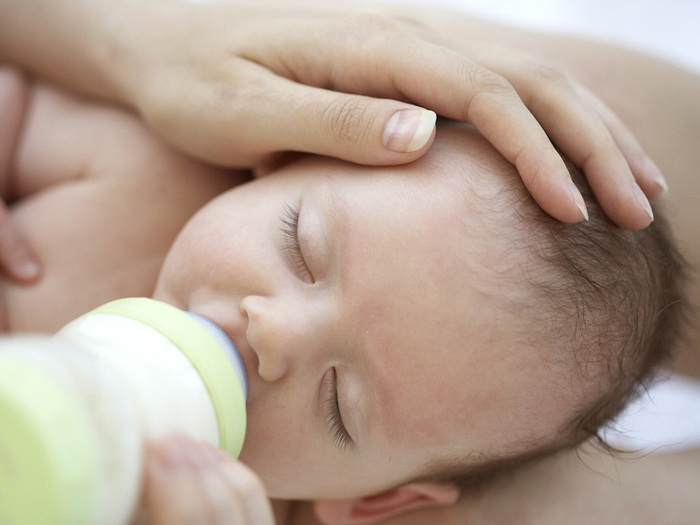 The main criterion in this matter is a calm child and a sleeping mother.
The main criterion in this matter is a calm child and a sleeping mother.
What else affects a child's sleep?
Now we know why the situation “hangs all night on the chest, doesn’t eat much, but it’s impossible to lay down again without a breast” can arise. The baby falls asleep as best he can, and he only knows how to fit with his breast in his mouth. At the age of 9-15 months, there are other reasons for a child’s poor sleep (not counting the “eternal teeth” and diseases):
- Stage of development: baby gets up, tries to walk. He can do this at night too - jump up right in his sleep. This is how he develops a new skill.
- Change of mode, transition from 2 dreams to 1. This can affect both the duration and quality of a night's sleep.
You need to help the baby survive the difficult stage, but try not to introduce new associations to sleep - for example, motion sickness.
How to separate breasts and sleep without curtailing breastfeeding?
It has been decided, we will not introduce new unwanted habits, but what about feeding at night? Maybe curtail breastfeeding, and the association food = sleep will disappear? But WHY end GW if it's enough just to separate feeding and falling asleep a little in time?
How to teach a child to fall asleep without a breast? When to feed the baby?
You can breastfeed 20-30 minutes before bedtime. And keep feeding in the morning, at 5-8 o'clock, if you want to keep lactation. If you want to sleep better, you can and should help your child learn to fall asleep on their own. Waking up at night, the baby will calmly roll over to the other side, or it will be enough to say: “sleep, my dear,” and he will continue his sweet dream. There are many methods of teaching self-sleep to sleep, but this article is not about them. Now we are interested in how to teach a child to fall asleep without a breast, how to separate food and sleep?
And keep feeding in the morning, at 5-8 o'clock, if you want to keep lactation. If you want to sleep better, you can and should help your child learn to fall asleep on their own. Waking up at night, the baby will calmly roll over to the other side, or it will be enough to say: “sleep, my dear,” and he will continue his sweet dream. There are many methods of teaching self-sleep to sleep, but this article is not about them. Now we are interested in how to teach a child to fall asleep without a breast, how to separate food and sleep?
I will give you some practical ways that you can adapt to your situation.
How to separate food and sleep? Practical tips
1. When a 4–6 month old baby suddenly falls asleep without a breast — rejoice!
If the child himself gives you such an opportunity, do not miss it. This ability (natural for many children) will greatly facilitate your life in the future. When the baby wakes up, feed him well. When it's time for bed, try laying him down again without breastfeeding. When the baby falls asleep on the chest - good; when without - support it. As a result, sleep will not depend on the breast.
When it's time for bed, try laying him down again without breastfeeding. When the baby falls asleep on the chest - good; when without - support it. As a result, sleep will not depend on the breast.
2. Prepare
If you decide to teach your child to fall asleep without a breast:
- Spend as much time as possible with your baby. Physical contact and closeness are very important. A lot of attention during the day - a calmer sleep at night.
- During the day, offer not only the chest, but also other ways to calm down - hug, carry, stroke, lie on the bed.
- Trust that comfort and comfort come from YOU, not just from your chest. Your confidence will be passed on to your child.
3. Change environment, bed ritual or “layer”
Mom will breastfeed, and then dad or grandmother will read a book, sing a song, hug and help fall asleep. On the first night, for example, on the handles, the main thing is without breasts. Practice shows that this method often works. The chances increase if there is a fairly clear regimen, a ritual of going to bed, masterful abilities of family members: an affectionate, calm, confident voice and the ability to distract.
Practice shows that this method often works. The chances increase if there is a fairly clear regimen, a ritual of going to bed, masterful abilities of family members: an affectionate, calm, confident voice and the ability to distract.
4. You can apply a quick method of learning to fall asleep on your own
There are different teaching methods. BabySleep does not use or recommend separation between baby and mother ("leave to cry"). Our techniques combine softness and fast efficiency. The methodology is selected by the consultant individually - the choice depends on the age of the child, his individual characteristics and temperament, habits, wishes of the mother and many other factors.
5. Fading technique
Fading is the gradual separation of food and sleep. No tears at all, very soft. But, unfortunately, this way is quite long. We act according to the rule "two steps forward - one step back."
Essence: We do not refuse to suck before going to bed! Mom feeds, and then offers to listen to a fairy tale or a song, talk, stroke - you need to experiment and find a way to distract.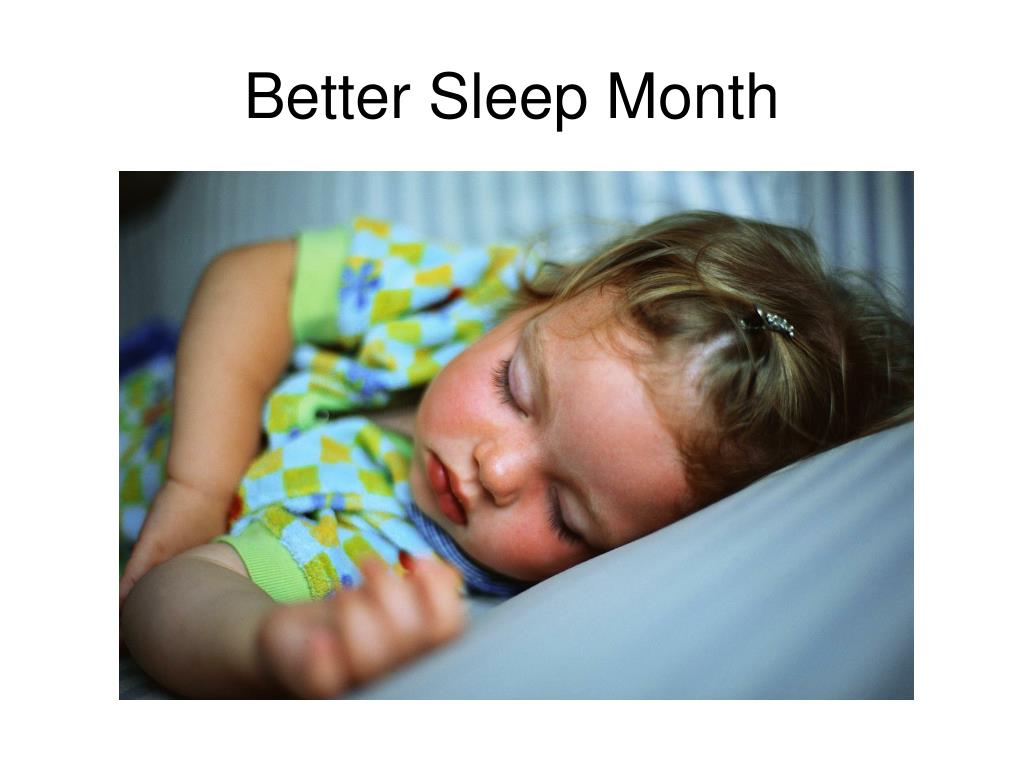
The baby may ask for a breast again. It is important that entertainment and breastfeeding do not occur at the same time. Mom gives the breast, but after a while she takes the breast again and distracts the child with a book or a conversation. If the baby wants to listen or talk, he stops suckling. At this stage, the goal of the mother is for the child to get used to the fact that before going to bed you can listen to something interesting or your mother can stroke him, and that you can fall asleep without a breast in your mouth.
After a while, the baby will sometimes be able to fall asleep without the breast in his mouth. When it becomes stable to feed, then sing or read to fall asleep, you can begin to “forget” to give your breast for sleep - that is, immediately move on to other methods of calming down. If the child does not want to forget, let him suck.
I wish you good sleep and happy breastfeeding!
#gw
1152216
', nextArrow: '', responsive: [{breakpoint: 1199, settings: {arrows: !1, infinite: !1, slidesToShow: 1}}] }) })How to sleep with a baby
establish a general routine
What do most women do when their baby falls asleep? Someone rushes to cook, someone begins to hastily clean the apartment, iron, wash - there are always plenty of things to do in the family. But in vain. You can do household chores even when the baby is awake, but he definitely won’t let you sleep. Therefore, if a son or daughter falls asleep, drop everything and go to bed with the child. There is no perfect order or dinner is not prepared? You can do all this later, when you rest, and, by the way, you will most likely spend much less time and effort. Therefore, the first rule of mom's regimen: sleep when the baby sleeps. To feel normal, a woman (especially a nursing mother) must sleep both at night and during the day. So adjust the general regimen of the day: you can adapt to the child’s sleep, or, on the contrary, you can adjust the child’s sleep to your routine (although this will be more difficult to do).
But in vain. You can do household chores even when the baby is awake, but he definitely won’t let you sleep. Therefore, if a son or daughter falls asleep, drop everything and go to bed with the child. There is no perfect order or dinner is not prepared? You can do all this later, when you rest, and, by the way, you will most likely spend much less time and effort. Therefore, the first rule of mom's regimen: sleep when the baby sleeps. To feel normal, a woman (especially a nursing mother) must sleep both at night and during the day. So adjust the general regimen of the day: you can adapt to the child’s sleep, or, on the contrary, you can adjust the child’s sleep to your routine (although this will be more difficult to do).
accept help
Use volunteers as often as possible to babysit, walk with or just feed your child. And here the help of the husband, grandparents will be invaluable. Do not trust the baby mother-in-law? Do you think that dad will not be able to entertain the baby for a couple of hours? Worried that grandpa will get lost with the baby while strolling around the house? In vain. Your loved ones are adults, they wish both you and the baby only the best and are unlikely to harm him in any way. At most, a diaper is buttoned crookedly, an extra blouse is put on the baby, or they give him the wrong nipple.
Your loved ones are adults, they wish both you and the baby only the best and are unlikely to harm him in any way. At most, a diaper is buttoned crookedly, an extra blouse is put on the baby, or they give him the wrong nipple.
If possible, make arrangements with your family so that they can babysit at least two or three times a week, giving you a couple of hours to sleep and rest. By the way, for this you can invite a nanny. And again - no household chores at this time, only - sleep!
sleeping with the baby
Co-sleeping has many advantages: the mother does not have to get up, wake up, go to the crib, get the baby out of it. She can feed the baby and at the same time almost never wake up: after all, the baby will find the breast on its own. Yes, and many children sleep only with their parents - in order to fall asleep, some babies need to feel the familiar smell and warmth of a loved one. This method has both its supporters and opponents, but in any case, if you choose to sleep together, you need to ensure the safety of the child. You can not put the child on the edge of the bed - he can turn around and fall to the floor; you can not put it next to the parent pillow - the baby may turn unsuccessfully and his breathing will be disturbed.
You can not put the child on the edge of the bed - he can turn around and fall to the floor; you can not put it next to the parent pillow - the baby may turn unsuccessfully and his breathing will be disturbed.
And it's best not to put the baby in the same bed with adults, but simply move the crib to the parent's bed, after removing the side rail from it (today there are even special cribs for sleeping together). So the child will feel the closeness of mom and dad, and parents will sleep peacefully, without worrying about his safety.
“Stock up” with sleep
Scientists have found that lack of sleep or insomnia is fully compensated by a full rash preceding it (or subsequent after it). And if so, then you can “stock up” on sleep. A couple of times a week (well, or one for sure) you need to arrange a day for yourself when the dream lasts 8-9hours per day. Here again, relatives or a nanny will come to the rescue. You can select once a week when you sleep all night, and dad gets up at night for the baby. True, this is convenient when the child is bottle-fed or at least agrees to drink expressed mother's milk from a bottle at night. If this is not possible, then you need to agree with your husband that, for example, on the weekend he takes the child and works with him for a couple of morning hours, and you fill up the missing time. Or let your grandmother (nanny) come in the morning, who will also let you make up for a night's sleep.
You can select once a week when you sleep all night, and dad gets up at night for the baby. True, this is convenient when the child is bottle-fed or at least agrees to drink expressed mother's milk from a bottle at night. If this is not possible, then you need to agree with your husband that, for example, on the weekend he takes the child and works with him for a couple of morning hours, and you fill up the missing time. Or let your grandmother (nanny) come in the morning, who will also let you make up for a night's sleep.
go to bed together at night
Usually, after putting her baby to bed, a mother either rushes to finish the day's chores, or tries to find time for herself (surf the Internet, read a book, watch TV, get a manicure). But it is the first three to four hours of sleep at night that children sleep best. Take note of this and go to bed at night at the same time as your baby. Otherwise, you have not yet had time to fall asleep (or just fell asleep), as the baby woke up for night feeding or just like that. As a result, you will get not only a shortened night's sleep, but for sure at night the baby will wake up a couple more times and interrupt it.
As a result, you will get not only a shortened night's sleep, but for sure at night the baby will wake up a couple more times and interrupt it.
put the child to bed early
As a rule, an adult who goes to bed early wakes up earlier. But in children there is no such pattern. Therefore, do not be afraid that today, having fallen asleep before 9 pm, tomorrow the baby will wake you up at dawn. On the contrary, the later the child falls asleep, the worse and more restless he sleeps. And just early laying gives a more complete and prolonged night's sleep. And this is exactly what a tired mom needs! But in order to establish such a daily routine, all family members will have to try. But then it becomes much easier for them.
Try to improve your routine and sleep more, and the whole family will feel much better. Even with a small child, it is possible not to feel sleep deprivation. Try it and see for yourself.
If this arrangement suits all members of your family, practice co-sleeping. This is a real salvation for mothers whose children often wake up at night. Sleep deficiency disrupts the formation of serotonin in the body - a biologically active substance, which is also called the hormone of happiness, calmness and good mood. As a result, a person deprived of normal rest constantly experiences irritability and a feeling of depression
Try to instill a regular sleep-wake schedule in your child. This will make your day more organized and make you less tired.
Attention! Prices for services in different clinics may vary. To clarify the current cost, select a clinic
Clinical Hospital MD GROUPClinical Hospital Lapino-1 "Mother and Child"Children's Clinic KG "Lapino" on New Riga (branch)Clinic "Mother and Child" KuntsevoClinic "Mother and Child" SavelovskayaClinic "Mother and Child" South-WestClinic "Mother and Child" » Novogireevo
All directions
01.

